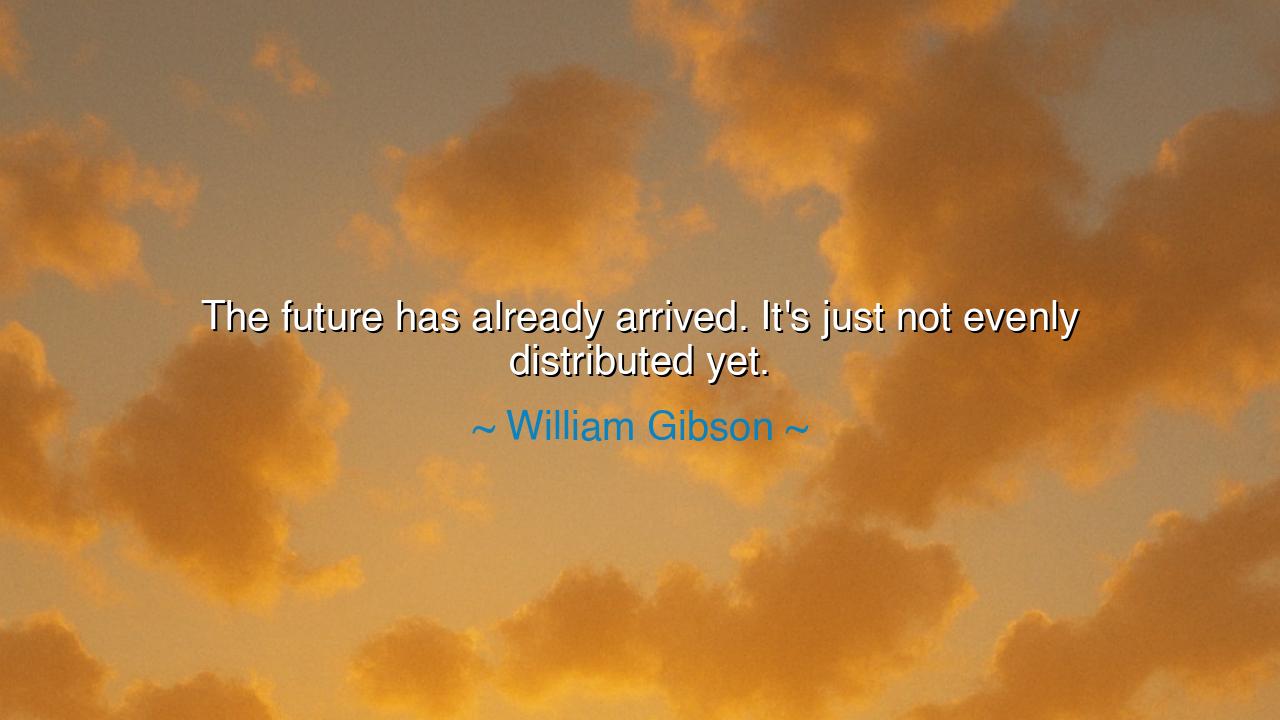
The future has already arrived. It's just not evenly distributed






“The future has already arrived. It's just not evenly distributed yet.” These words, spoken by William Gibson, carry with them a profound insight into the nature of progress, technology, and society. In this succinct statement, Gibson highlights a truth that has echoed through the ages: the promise of the future—in its fullest form—has already arrived, but it is not universally accessible. The benefits of progress, whether they be technological, economic, or cultural, are often concentrated in certain regions, communities, or individuals, leaving vast swathes of the world untouched by the innovations that define modern life.
In the ancient world, there was often a great divide between those who had access to knowledge and resources, and those who did not. In Rome, for example, the elite were often the sole beneficiaries of the advancements in art, engineering, and military tactics. These innovations, while revolutionary, were not shared with the masses. Instead, the common people lived lives that were largely unchanged, their daily existence governed by age-old practices. This divide, though perhaps not as stark as Gibson’s technological one, mirrors the inequality he speaks of in the modern world—a world where the future is not distributed equally across all of humanity.
Gibson’s statement calls to mind the Industrial Revolution, a time when technological advancements, like the steam engine and mechanized farming, radically changed the landscape of society. Yet, this new world did not come equally to all. The wealthy landowners and factory owners reaped the benefits of these innovations, while the working classes toiled in conditions that were largely unchanged. It was a time of great potential, but one where that potential was hoarded by the few. The future—in the form of technological progress and societal change—had arrived, but it was not distributed evenly.
This divide continues today in the form of the digital divide, where access to the internet, modern healthcare, and technological advancements remains out of reach for millions. The people of Silicon Valley, for example, live in a world where the future is realized in the form of autonomous vehicles, artificial intelligence, and cutting-edge medical treatments. Yet, just a few miles away, there are those whose daily lives remain governed by poverty, lack of education, and limited access to technology. The future has arrived for some, but for many, it remains an abstract concept, something promised but never fully realized.
The wisdom of Gibson’s quote is not just an observation, but a call to action. If the future has indeed arrived but remains unevenly distributed, it is the duty of those who benefit from this progress to ensure that it is shared more equitably. History has shown us that inequality breeds discontent, and in times past, this discontent has led to revolutions, wars, and social upheaval. Alexander the Great, in his conquests, spread the knowledge of Greek culture across the known world, but his empire fractured quickly after his death, as the benefits of his rule were not shared among the masses. Gandhi, too, saw the effects of inequality, and in his struggle for Indian independence, he emphasized the importance of lifting up the marginalized and oppressed. His vision of the future was one where the benefits of progress and freedom were shared equally among all people.
The lesson of Gibson’s words is clear: the future is not a distant dream—it is already here. But it is incumbent upon us to ensure that it is distributed more evenly. We must ask ourselves: how can we work to share the advancements we have made with those who have not yet benefited? How can we use our access to technology, knowledge, and resources to improve the lives of those who remain on the other side of the divide? The challenge lies not in waiting for the future to arrive, but in making sure that it touches everyone, regardless of their social, economic, or geographic standing.
In practical terms, this means investing in education, bridging the digital divide, and creating systems of support that allow all people to access the tools and resources they need to thrive in the modern world. It means advocating for policies that ensure the benefits of technological and economic progress are shared, not hoarded. By doing so, we can ensure that the future is not just a promise for some, but a reality for all.






AAdministratorAdministrator
Welcome, honored guests. Please leave a comment, we will respond soon